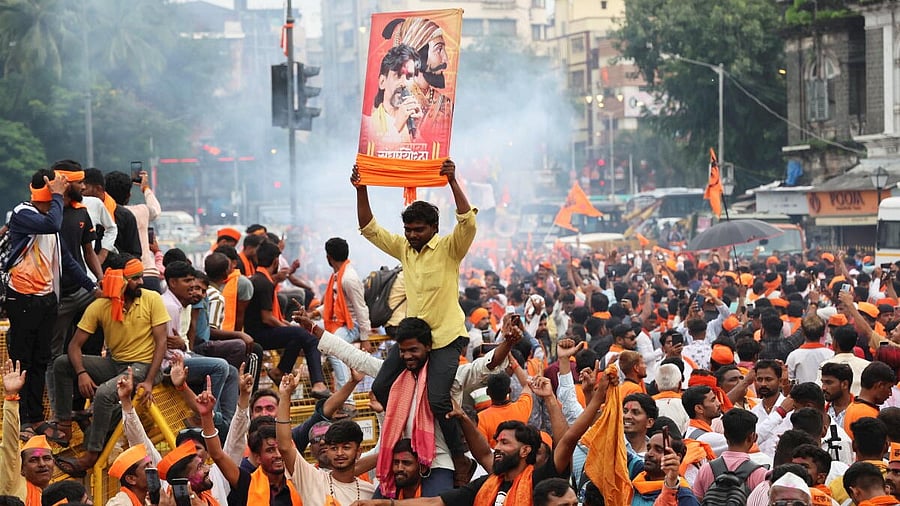
Maratha community members celebrate after the Maharashtra government accepted most of activist Manoj Jarange Patil's demands, including granting eligible Marathas Kunbi caste certificates which will make them eligible for reservation benefits available to OBCs, in Mumbai, Tuesday, Sept. 2, 2025.
Credit: PTI Photo
Mumbai: The strong stance taken by the Bombay High Court over the last couple of days played an important role in ending the crisis involving the Maratha reservation issue.
While on Monday, a bench comprising Justice Ravindra Ghuge and Justice Gautam Ankhad heard the matter, on Tuesday — the fifth day of the agitation — it came before Justice Shree Chandrashekhar, the acting Chief Justice and Justice Aarti Sathe.
On both these days, during the agitation that lasted from August 29 to September 2, the court expressed deep concern over the situation in South Mumbai and not only rapped Manoj Jarange-Patil, his team and the protestors but also pulled up the Maharashtra government for not foreseeing the situation.
As part of the protests, lakhs of protestors from across the state arrived in Mumbai. The court asked the Devendra Fadnavis-led state government to take a call on whether to offer an alternative place at Kharghar in Navi Mumbai in the neighbouring Raigad district to hold the protest.
However, the Mumbai police agreed to allow Jarange-Patil to protest for a day only in Azad Maidan and put a cap of 5,000 protestors - which they had to keep on extending because of the influx of people.
On Monday, the court ordered the Maharashtra government to clear Mumbai's streets of the protesters and ask them to be at the designated place and in decided numbers.
“The situation is grim and the city of Mumbai has been practically brought to a standstill. We are giving Jarange and his supporters an opportunity to rectify the situation immediately and ensure the streets are vacated and cleaned up by Tuesday noon….We can see how peaceful the protest is. The high court building is surrounded. The entry gates for the judges and lawyers are blocked. The cars of high court judges were blocked today and prevented from coming to court today. The entire city has been blocked,” the bench of Justice Ghuge and Justice Ankhad said.
On Tuesday, Justice Chandrashekhar and Justice Sathe took it further - and in the morning asked Jarange and all protesters to vacate the site before 3 pm.
“After 3 pm today, we will ensure no one sits there... If need be, we will send someone or we will ourselves visit the roads and the site to check everyone has left,” the bench said.
The police immediately swung into action under the leadership of Deputy Commissioner of Police (Zone 1) Dr Pravin Mundhe and a huge contingent comprising officers and personnel of Mumbai Police and Riot Control Police started implementing the order. “Please cooperate with us…we are implementing court orders…it is the duty of the police and you all to abide by the court order,” Mundhe said even as police teams made repeated announcements at Azad Maidan, Mahapalika Marg, Dr Dadabhai Naoroji Road, Chhatrapati Shivaji Maharaj Terminus and BrihanMumbai Municipal Corporation headquarters.
In the court, Senior Counsel Satish Maneshinde, who appeared for Jarange-Patil and other organisers, tendered an apology for the inconvenience caused by the protestors on the streets of Mumbai. "I would also like to point out the poor facilities for drinking, parking etc made available by the State. I had called upon the State and intimidated them about the protests, at least four months ago but yet they did not make any proper arrangements,” he told the court and decided to abide by the court.
The court also asked Advocate General Dr Birendra Saraf to furnish details of steps taken by the State to ensure no inconvenience is caused to citizens.
The court accepted the request of Maneshinde to allow time till Wednesday morning -as talks were to be held with the government.
“But before parting with this order, we must indicate that this court would be constraint to pass any orders and to go to any extent to uphold the Majesty of the law in as much as any breach of the order passed by this court shall not be tolerated and appropriate action shall be taken against violators,” the court observed.
“We have served a notice to Jarange-Patil… He being a very influential person can make a genuine effort to make his followers… Only his appeal can help disperse the crowds,” submitted Saraf.
However, Justice Chandrashekar asked: “So, you are relying on his popularity? Why can’t you implement our orders? You could have got it forcefully vacated…This is very serious, we are very very unhappy with your conduct. Can we permit breach and violation of our orders, that too for days together?”
After the protest ended, Fadnavis said: "People of Mumbai had to face inconvenience for which I wish to express regret."